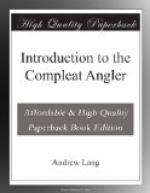The only contemporary criticism known to me is that of Richard Franck, who had served with Cromwell in Scotland, and, not liking the aspect of changing times, returned to the north, and fished from the Esk to Strathnaver. In 1658 he wrote his Northern Memoirs, an itinerary of sport, heavily cumbered by dull reflections and pedantic style. Franck, however, was a practical angler, especially for salmon, a fish of which Walton knew nothing: he also appreciated the character of the great Montrose. He went to America, wrote a wild cosmogonic work, and The Admirable and Indefatigable Adventures of the Nine Pious Pilgrims (one pilgrim catches a trout!) (London, 1708). The Northern Memoirs of 1658 were not published till 1694. Sir Walter Scott edited a new issue, in 1821, and defended Izaak from the strictures of the salmon-fisher. Izaak, says Franck, ’lays the stress of his arguments upon other men’s observations, wherewith he stuffs his indigested octavo; so brings himself under the angler’s censure and the common calamity of a plagiary, to be pitied (poor man) for his loss of time, in scribbling and transcribing other men’s notions. . . . I remember in Stafford, I urged his own argument upon him, that pickerel weed of itself breeds pickerel (pike).’ Franck proposed a rational theory, ’which my Compleat Angler no sooner deliberated, but dropped his argument, and leaves Gesner to defend it, so huffed away. . . . ’ ’So note, the true character of an industrious angler more deservedly falls upon Merrill and Faulkner, or rather Izaak Ouldham, a man that fished salmon with but three hairs at hook, whose collections and experiments were lost with himself,’—a matter much to be regretted. It will be observed, of course, that hair was then used, and gut is first mentioned for angling purposes by Mr. Pepys. Indeed, the flies which Scott was hunting for when he found the lost Ms. of the first part of Waverley are tied on horse-hairs. They are in the possession of the descendants of Scott’s friend, Mr. William Laidlaw. The curious angler, consulting Franck, will find that his salmon flies are much like our own, but less variegated. Scott justly remarks that, while Walton was habit and repute a bait-fisher, even Cotton knows nothing of salmon. Scott wished that Walton had made the northern tour, but Izaak would have been sadly to seek, running after a fish down a gorge of the Shin or the Brora, and the discomforts of the north would have finished his career. In Scotland he would not have found fresh sheets smelling of lavender.
Walton was in London ‘in the dangerous year 1655.’ He speaks of his meeting Bishop Sanderson there, ’in sad-coloured clothes, and, God knows, far from being costly.’ The friends were driven by wind and rain into ’a cleanly house, where we had bread, cheese, ale, and a fire, for our ready money. The rain and wind were so obliging to me, as to force our stay there for at least an hour, to my great content and advantage; for in that time he made to me many useful observations of the present times with much clearness and conscientious freedom.’ It was a year of Republican and Royalist conspiracies: the clergy were persecuted and banished from London.




